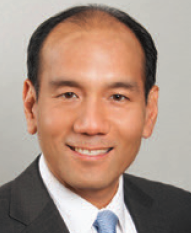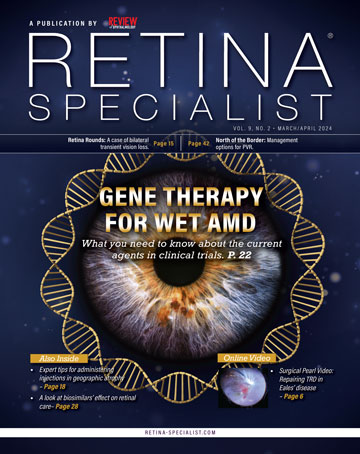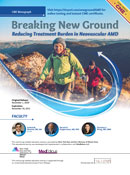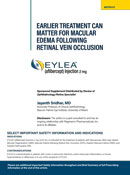There are certainly days that tempt me to go to my knees. The continuous influx of new data and regulatory requirements can be overwhelming. Don’t let it be. You and I, retina docs on the front line, are the tip of the sword. We are the real point of care—not the politicians on their stump, the EMR, the newest imposing regulation, the thought of a malpractice suit, or the headache of insurance verifications. Your patients’ vision depends on you, in the moment, doing the right thing for them alone. Take a deep, slow breath and tap into that feeling that brought you here in the first place.
One of the reasons I went into retina is because I love to operate. It is extraordinarily gratifying to care for a patient through necessary surgical intervention. Toward this end, three articles in this “Focus on Surgery” theme issue consider specific facets of retinal surgery:
• “Making the Case for Combined Phacovitrectomy” by Rohit Adyanthaya, MD (page 20).
• “A Novel Approach for Retinal Detachment in Viral Retinitis” by David R.P. Almeida, MD, MBA, PhD, and Eric K. Chin, MD (page 24).
• “A Simplified Three-Step Approach to Macular Peeling” by Robert A. Sisk, MD (page 27).
Another reason I went into retina is the excitement of new discoveries in clinical research. I have considered diabetic retinopathy to be a progressive retinal vascular disease initiated by blood vessel damage and regional hypoxia, with the key clinical manifestations being diabetic macular edema and proliferative diabetic retinopathy.
However, accumulating evidence suggests diabetic neuropathy of the retina may precede the vascular damage we see clinically and histopathologically. Aaron M. Ricca, MD, Elliott H. Sohn, MD, and Michael D. Abramoff, MD, PhD, explore the data behind this possibility with potentially substantial management implications (page 32).
Yes, the bureaucratic quagmire of modern medicine can be enough to make anyone want to walk away. But, it is a privilege to care for patients with blinding diseases. Sight is precious above all other senses. We must remind each other and ourselves why we became retina specialists in the first place. Keep up the good fight and support each other to avoid burnout.
 |
1. Shanafelt TD, Hasan O, Dyrbye LN, et al. Changes in burnout and satisfaction with work-life balance in physicians and the general US working population between 2011 and 2014. Mayo Clin Proc. 2015;90:1600-1613.




